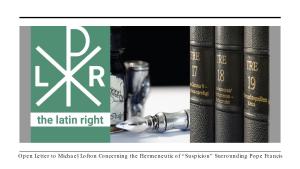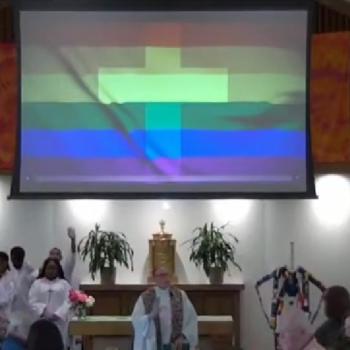Hello Michael,
First, allow me to state that I enjoy watching your channel, Reason & Theology, and find your content exceptional and engaging. For the most part, I agree with your clarifications of Pope Francis’ comments and teachings. However, as I have written about on my blog at Patheos (The Latin Right), many of the Holy Father’s actions contribute to the hermeneutic of “suspicion” many traditionalist clerics and pundits employ when engaging the Pope’s writings and comments. I ask you in a spirit of charitable correction and dialogue to explain (“Popesplain”) the below actions of Pope Francis and how the faithful ought to understand them.
-
The elevation of “questionable” clerics to cardinals
In my article, How to Demoralize the Church (HTDTC), I wrote:
…the Pope has elevated to “princes of the Church” prelates that question or directly contradict Church moral teaching. Below are the comments of two American cardinals, created by Pope Francis, dissenting from official Church teaching.
“…the church must embrace a eucharistic theology that effectively invites all of the baptized to the table of the Lord, rather than a theology of eucharistic coherence that multiplies barriers to the grace and gift of the eucharist. Unworthiness cannot be the prism of accompaniment for disciples of the God of grace and mercy.”
“But how can you welcome people that you call ‘intrinsically disordered?’” Thompson asked.
“Well, I don’t call them ‘intrinsically disordered,’” Tobin answered.
“But isn’t that the Catechism of the Catholic Church?” Thompson asked.
“That is,” Tobin said, adding “it’s very unfortunate language. Let’s hope that eventually that language is a little less hurtful.”
In another article, Cracking the Code of Synodality, I bring up Cardinal Jean-Claude Hollerich (elevated by Pope Francis to the relator general of the Synod of Synodality) and his views regarding human sexuality that are at odds with Pope Francis’ magisterial teaching:
In an interview with the German Catholic news agency KNA, Cardinal Hollerich made the following statement when asked how he gets around the Church’s teaching that homosexual activity is sin:
“I believe that this is false. But I also believe that here we are thinking further about the teaching. So, as the Pope has said in the past, this can lead to a change in teaching. So I believe that the sociological-scientific foundation of this teaching is no longer correct, what one formerly condemned was sodomy.”
And
“The Church has always moved with the times and has always adapted. But one always had much more time to do that. Today we must be faster. Otherwise, we lose contact and can no more be understood.”
Again, how ought the faithful interpret Pope Francis’ actions in elevating clerics who dissent from the Pope’s own magisterial teachings?
-
A light hand with Germany
Furthermore, as you and others point out often, the Holy Father exercises an extremely light hand in dealing with the dissention in Germany. Again, as I pointed out in HTDTC:
Given the extreme dissention of the Catholic Church in Germany, the response from the Vatican seems tame. Thus far, the Vatican released one official rebuke issued by the then named Congregation for the Doctrine of the Faith against blessing same-sex couples. Furthermore, only one bishop resigned and this was due to his mismanagement during the sex abuse crisis. Surprisingly, The National Catholic Reporter reports that six German bishops have offered their resignation to Pope Francis over the past few years and each, except Bishop Franz-Josef Bode, were rejected. One of those, Cardinal Reinhard Marx, called for a change in the Catechism regarding homosexuality and called homosexuality “not a sin.” To reiterate, Cardinal Marx publicly teaches contrary to Church moral teaching (among other troubling things) and also offered his resignation to Pope Francis, yet Pope Francis declined to accept it.
As you pointed out in your latest videos, Pope Francis seems uninterested in correcting dissent. But how does one explain not accepting the resignation of dissenting bishops when such resignations were offered freely?
-
The public access to Pope Francis by dissident groups like New Ways Ministries
On October 17th, Pope Francis met privately with representatives of the U.S. LGBTQ advocacy group New Ways Ministry. This group recently came out with a statement claiming the Holy Father’s answers to the dubias “signaled” an openness to same-sex blessings. Particularly:
This new step, outlined in a document released on October 2nd by the Vatican’s Dicastery for the Doctrine of the Faith, allows for pastoral ministers to administer such blessings on a case-by-case basis, advising that “pastoral prudence” and “pastoral charity” should guide any response to couples who request a blessing.
And
The allowance for pastoral ministers to bless same-gender couples implies that the church does indeed recognize that holy love can exist between same-gender couples, and the love of these couples mirrors the love of God. Those recognitions, while not completely what LGBTQ+ Catholics would want, are an enormous advance towards fuller and more comprehensive equality. This statement is one big straw towards breaking the camel’s back of the marginalized treatment LGBTQ+ people experience in the Church.
Now, as you often point out, the above statement is false. The Pope does NOT approve the blessing of same-sex unions. However, when the Holy Father meets with a group that grievously misunderstand him, questions will arise as to the nature and scope of the visit.
The Hermeneutic of “Suspicion”
Michael, considering all I pointed out above (and others not mentioned), do you not see that Pope Francis laid the foundation for the hermeneutic of “suspicion” partially himself? Furthermore, the Holy Father’s two immediate predecessors, Benedict XVI and John Paul II, understood the weight of their words and therefore wrote with intentional precision. As you yourself point out regularly, Pope Francis tends to write with more ambiguity, which in turn contributes to the aforementioned hermeneutic of “suspicion.” One wonders, does the Pope not understand that his actions provide the context for which his words get misinterpreted?
My prayer, and the prayer of many of my readers who also pray and support Pope Francis, is for a return, in some way, to the intentional precision of the past two pontificates. This would go a long way towards avoiding any unnecessary confusion and squash any attempt at hermeneutics of “suspicion” before they even take root.
Open to Correction
In closing, again, thank you for all your hard work over at Reason and Theology. I hope more people subscribe and that your platform grows in order to reach more people with your well-informed content. I am open to any correction you wish to offer in any format you wish to offer it in. My readers and I would greatly benefit from any clarification you wish to offer.
God bless you and your ministry.
Dennis Knapp
The Latin Right
Thank you!
Read The Latin Right’s other writing here.














